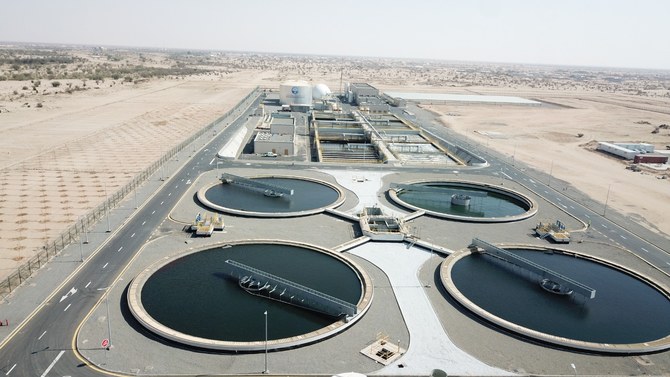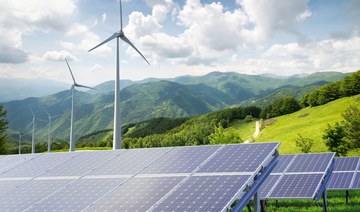RIYADH: When a consortium of water infrastructure companies closed green loans worth $480 million for three independent sewage treatment plants in Saudi Arabia last March, it was a harbinger of the verdant opportunity that awaited the Kingdom’s sustainable projects.
It was a watershed moment for the consortium of Saudi companies Tawzea, Tamasuk, and Spanish firm Acciona when they secured the amount for three ISTPs — Madinah 3, Buraidah 2, and Tabuk 2 — in just six months of expressing their interest.
What made the project a prime beneficiary of green financing was its commitment to the sustainability goals envisaged by the Saudi Vision 2030 and the endeavors of Saudi Water Partnership Co., the state-run company which facilitates the commercialization of water and electricity in the Kingdom.
Saudi Arabia is making headlines by taking measures to ensure a smooth transition to green energy and fight climate change. The Kingdom will host the 44th International Association for Energy Economics International Conference from Feb. 4-9 to discuss the path for a sustainable future.
“The construction and operation of the ISTPs will aid in optimizing the use of water resources in Saudi Arabia by providing treated and renewable water to be used for agricultural purposes, therefore reducing the consumption of freshwater,” said María Ortiz de Mendivil, primary analyst, S&P Global Ratings, in a second-party opinion note certifying the projects as green.
Once completed, Madinah 3 will serve up to 1.5 million inhabitants of existing and future residential areas near the city of Madinah. It will have an initial treatment capacity of 200,000 m³ per day, which can be expanded to 375,000 m³ per day.
Buraidah 2 will serve up to 600,000 people and have a capacity of 150,000 m³ per day. Tabuk 2, serving up to 350,000 people, will facilitate 90,000 m³ per day.
The treated water will replace freshwater resources for farming, saving this scarce resource and contributing directly to the nation’s water security. Daily water savings are expected to amount to 190,000 m³ per day at Madinah 3, 142,500 at Buraidah 2, and 85,500 at Tabuk 2.
HIGHLIGHTS
Madinah 3 will have an initial treatment capacity of 200,000 m³ per day, which can be expanded to 375,000 m³ per day.
Buraidah 2 will serve up to 600,000 people and have a capacity of 150,000 m³ per day.
Tabuk 2, serving up to 350,000 people, will facilitate 90,000 m³ per day.
“We have a zero-sludge-dispatch policy, meaning that all the sludge that we produce in these wastewater treatment plants is either used by farmers to replace other fertilizers or sent to cement factories for the production of cement,” said Julio De La Rosa, the Middle East business development director of Acciona Agua, while speaking at an International Desalination Association’s forum held two months ago.
Additionally, the photovoltaic solar panels installed at each plant will generate renewable power that will partially cover their daily energy consumption.
The green-certified project drew the attention of the bigwigs of the finance world, such as Abu Dhabi Islamic Bank, Mitsubishi UFJ Financial Group, Alimna Bank, Riyad Bank, and Siemens Bank, which parked their investments at first blush.
Green loans for a greener planet
So, what exactly is a green loan? According to the World Bank, a green loan is a form of financing that enables borrowers to use the proceeds to exclusively fund projects that make a substantial contribution to an environmental objective.
It is similar to a bond. The only difference is that a loan is typically smaller than a bond and executed in private operations. Also, green loans and green bonds follow different but consistent principles: The Green Loan Principles and the Green Bond Principles of the International Capital Market Association.
This green financing assumes significance as investors worldwide are earmarking their funds into sustainable investment projects that neutralize greenhouse gases and run on renewable energy, making them attractive propositions in an environmentally conscious world.
Saudi Arabia, particularly, has been facing severe challenges due to the unsustainable use of water resources, and it has limited reserves of nonrenewable groundwater, which are depleting rapidly. In addition, high water demand in the agriculture sector has also exacerbated the water scarcity situation.
According to figures published by the Minister of Environment, Water and Agriculture, between 1985 and 2020, the water level in the Kingdom almost dropped by 90 meters. That led to the National Water Strategy, inspired by the Vision 2030 blueprint, which identified levers and enablers to fix the problem.
“The National Water Strategy reshaped the private sector, which has started to think about how to be efficient and contribute to the water strategy, gain benefits as per their sustainability roadmap and accommodate the environment, social and governance in their strategies,” said Mohammed Al Halawani, CEO of Tawzea.
This public-private partnership has spawned many efficient independent water and power projects and desalination plants that are fast becoming textbook case studies for sustainable projects worldwide.
An excellent case study of the PPP is the Taif Independent Sewage Treatment Plant, which was developed by Cobra & Tawzea and had a treatment capacity of 1,00,000 m³ per day.
It is the first ISTP that reached commercial operation in Saudi Arabia from the private sector under the build-operate-transfer model.
The plant has less than 0.35 kilowatt-hour per m³ electricity consumption. About 30 percent of the electricity was recovered by biogas cogeneration. Even the residual output was 90 percent dry solids and beneficial class-A sludge.
“Over 210,000 sq. m of trees will be introduced as part of the project with the support of the Saudi Green Initiative, which is equivalent to approximately sequestering 136 tons of carbon dioxide per year,” said Al Halawani.
Sustainable to the core
Another example is the Shuaibah 3 Water Desalination Co., a special-purpose vehicle created to finance and develop the Shuaibah 3 Independent Water Project.
The company was launched by Saudi utility developer ACWA Power and Water & Electricity Holding Co., also known as Badeel, both owned in part or whole by the Public Investment Fund.
The project aims to replace a thermal desalination plant, the Shuaibah 3 IWPP, powered by fossil fuels. The use of reverse osmosis technology makes the proposed plant more energy efficient than the previous thermal desalination plant that will come offline.
The conventional thermal desalination process, multi-stage flash distillation, and multiple-effect distillation produced nearly 20 kg of carbon dioxide equivalent per m³. However, the carbon footprint for the RO process could be anywhere from 0.4 to 6.7 kg of carbon dioxide equivalent per m³.
According to ACWA Power, this technology shift could accrue savings of about 45 million tons of carbon dioxide yearly.
That’s not all. Green financing is greenlighting a host of projects worldwide, and for the first time, more money was raised in the debt markets in 2022 for climate-friendly projects than fossil-fuel companies.
According to a Bloomberg report, roughly $580 billion was arranged in 2022 for renewable energy and other environmentally responsible ventures, while the oil, gas, and coal industries turned to lenders and underwriters for closer to $530 billion.
While it may not indicate that green financing is finally having an upper hand on oil lenders, the well-trodden bazaars of fossil fuel funding have become eerily cold after the global pushback on loss and damage during the UN Climate Change Conference in Egypt last year.
Saudi Arabia, on its part, lives by the age-old adage: You never miss the water till the well runs dry. While going to press, Saudi power juggernaut ACWA Power announced that it added 2.4 million m³ day of water desalination capacity across four reverse osmosis megaprojects in 2022, the largest in a calendar year in the company’s history.
This achievement brings the company’s total water capacity under management to 6.4 million m³ across 16 projects in four countries, producing water at less than $0.50 per m³, which is up to three-quarters lower than the tariff of $2 per m³ just a few years ago.
Ergo, the message is loud and clear: The future of infrastructure financing is green, or there’s no future at all.




















